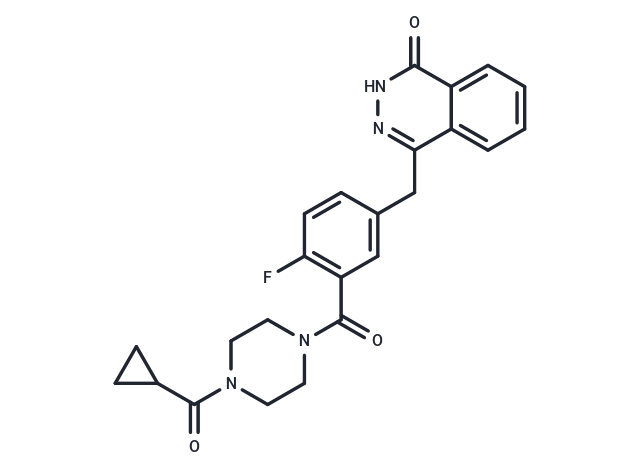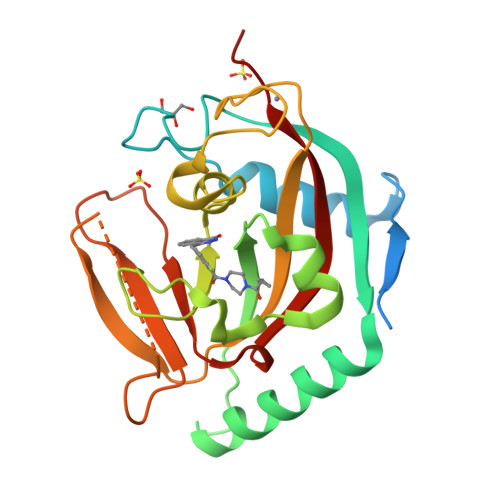 您的购物车当前为空
您的购物车当前为空
Olaparib
一键复制产品信息别名 奥拉帕尼, KU0059436, AZD2281
Olaparib (KU0059436) 是 PARP1/PARP2 的小分子抑制剂 (IC50=5/1 nM),对 PARP tankyrase-1 的抑制活性较弱 (IC50=1.5 μM),具有选择性和口服活性。Olaparib 具有自噬和线粒体自噬激活活性。

Olaparib
一键复制产品信息Olaparib (KU0059436) 是 PARP1/PARP2 的小分子抑制剂 (IC50=5/1 nM),对 PARP tankyrase-1 的抑制活性较弱 (IC50=1.5 μM),具有选择性和口服活性。Olaparib 具有自噬和线粒体自噬激活活性。
| 规格 | 价格 | 库存 | 数量 |
|---|---|---|---|
| 5 mg | ¥ 265 | 现货 | |
| 10 mg | ¥ 396 | 现货 | |
| 50 mg | ¥ 995 | 现货 | |
| 100 mg | ¥ 1,597 | 现货 | |
| 200 mg | ¥ 2,398 | 现货 | |
| 500 mg | ¥ 3,997 | 现货 | |
| 1 g | ¥ 5,500 | 现货 | |
| 1 mL x 10 mM (in DMSO) | ¥ 282 | 现货 |
Olaparib 相关产品
产品介绍
| 产品描述 | Olaparib (KU0059436) is a small molecule inhibitor of PARP1/PARP2 (IC50=5/1 nM), with weak inhibitory activity against PARP tankyrase-1 (IC50=1.5 μM), and is selective and orally active. Olaparib exhibits autophagy and mitochondrial autophagy activation activity. |
| 靶点活性 | PARP1:5 nM (cell free), tankyrase 1:1.5 μM, PARP2:1 nM (cell free) |
| 体外活性 | 方法:人子宫颈癌细胞 SiHa 和 ME180 用 Olaparib (5-10 µM) 和 cisplatin (1-30 µM) 处理 72 h,使用 MTT 方法检测细胞生长抑制情况。 |
| 体内活性 | 方法:为检测体内抗肿瘤活性,将 Olaparib (10 mg/kg) 和 TMZ (50 mg/kg) 口服给药给携带人结直肠癌肿瘤 SW620 的小鼠,每天一次,持续五天。 |
| 激酶实验 | This assay determined the ability of test compounds to inhibit PARP-1 enzyme activity. The method that was used was as reported. We measured PARP-2 activity inhibition by using a variation of the PARP-1 assay in which PARP-2 protein (recombinant) was bound down by a PARP-2 specific antibody in a 96-well white-walled plate. PARP-2 activity was measured following 3H-NAD+ DNA additions. After washing, scintillant was added to measure 3 H-incorporated ribosylations. For tankyrase-1, an AlphaScreen assay was developed in which HIS-tagged recombinant TANK-1 protein was incubated with biotinylated NAD+ in a 384-well ProxiPlate assay. Alpha beads were added to bind the HIS and biotin tags to create a proximity signal, whereas the inhibition of TANK-1 activity was directly proportional to the loss of this signal. All experiments were repeated at least three times [1]. |
| 细胞实验 | HSC-2, Ca9-22, and SAS oral carcinoma cells were seeded in 24-well plates at a density of 2 × 104 cells/well. After overnight incubation, the culture medium was replaced with fresh medium containing various concentrations of PARP inhibitor AZD228 or cisplatin. After 24 h of treatment, the number of viable cells was assessed using an MTT assay as reported previously. Briefly, one-tenth of the fluid volume of 5 mg/mL MTT in RPMI-1640 medium was added to each well, followed by incubation for 4 h at 37 °C. After incubation, the medium was carefully removed and an adequate volume of 0.1 N HCl in isopropanol was added to each well and the resultant formazan crystals was dissolved. Absorbance was determined at 570 nm by microplate reader in 96-well assay plates. All experiments were performed in triplicate [2]. |
| 动物实验 | Once the tumor diameter had reached 7 mm, the mice were randomly assigned to the following groups: (a) control (200 μL saline); (b) cisplatin (2 mg/kg per body weight, dissolved in 200 μL sterilized water); (c) AZD2281 (25 mg/kg per body weight, dissolved in 200 μL sterilized water); or (d) combination (both cisplatin and AZD2281). The chemicals were administered intraperitoneally every three days, five times. Although AZD2281 is administered orally in the clinic, intraperitoneal injection was recommended by the manufacturer because of easier manipulation and the ethical constraints associated with oral gavage administration to mice. Tumor size and body weight were measured at the time of administration. The tumor volume was calculated using following equation. Tumor volume = verticality × width × height × 0.5236. Three days after the last administration, all surviving mice were sacrificed [2]. |
| 别名 | 奥拉帕尼, KU0059436, AZD2281 |
| 分子量 | 434.46 |
| 分子式 | C24H23FN4O3 |
| CAS No. | 763113-22-0 |
| Smiles | C(C=1C=2C(C(=O)NN1)=CC=CC2)C3=CC(C(=O)N4CCN(C(=O)C5CC5)CC4)=C(F)C=C3 |
| 密度 | 1.43 |
| 颜色 | White |
| 物理性状 | Solid |
| 存储 | Powder: -20°C for 3 years | In solvent: -80°C for 1 year | Shipping with blue ice/Shipping at ambient temperature. | |||||||||||||||||||||||||||||||||||
| 溶解度信息 | H2O: < 1 mg/mL (insoluble) DMSO: 82.5 mg/mL (189.89 mM), Sonication is recommended. Ethanol: < 1 mg/mL (insoluble or slightly soluble) | |||||||||||||||||||||||||||||||||||
| 体内实验配方 | 10% DMSO+40% PEG300+5% Tween 80+45% Saline: 8 mg/mL (18.41 mM), Solution. 请按顺序添加溶剂,在添加下一种溶剂之前,尽可能使溶液澄清。如有必要,可通过加热、超声、涡旋处理进行溶解。工作液建议现配现用。以上配方仅供参考,体内配方并不是绝对的,请根据不同情况进行调整。 | |||||||||||||||||||||||||||||||||||
溶液配制表 | ||||||||||||||||||||||||||||||||||||
DMSO
| ||||||||||||||||||||||||||||||||||||
化合物与蛋白结合的复合物

HUMAN ARTD2 (PARP2) - CATALYTIC DOMAIN IN COMPLEX WITH OLAPARIB




 很棒
很棒

 |
|
评论内容